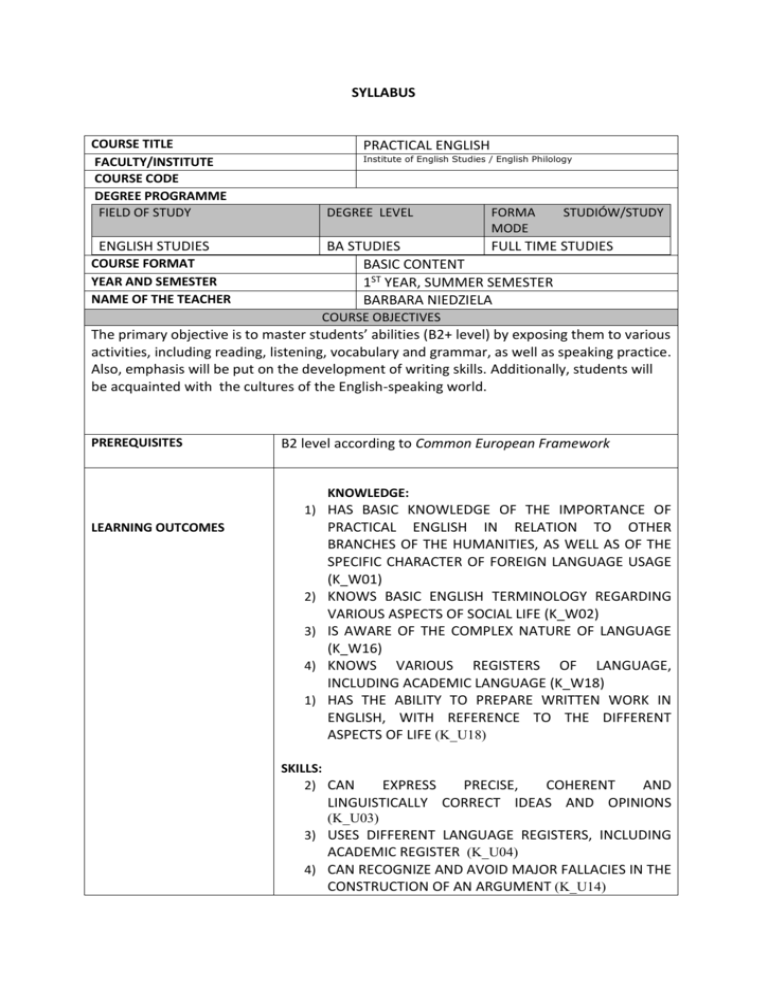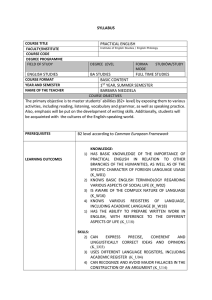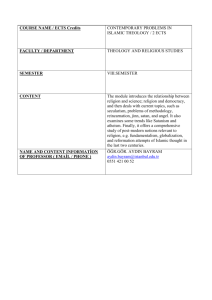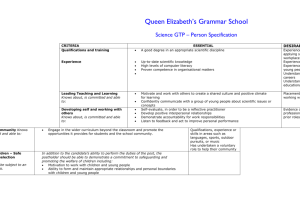SYLLABUS COURSE TITLE practical english Faculty/Institute
advertisement

SYLLABUS COURSE TITLE FACULTY/INSTITUTE COURSE CODE DEGREE PROGRAMME FIELD OF STUDY PRACTICAL ENGLISH Institute of English Studies / English Philology DEGREE LEVEL ENGLISH STUDIES FORMA MODE STUDIÓW/STUDY BA STUDIES FULL TIME STUDIES BASIC CONTENT 1ST YEAR, SUMMER SEMESTER BARBARA NIEDZIELA COURSE FORMAT YEAR AND SEMESTER NAME OF THE TEACHER COURSE OBJECTIVES The primary objective is to master students’ abilities (B2+ level) by exposing them to various activities, including reading, listening, vocabulary and grammar, as well as speaking practice. Also, emphasis will be put on the development of writing skills. Additionally, students will be acquainted with the cultures of the English-speaking world. PREREQUISITES B2 level according to Common European Framework KNOWLEDGE: 1) HAS BASIC KNOWLEDGE OF THE IMPORTANCE OF LEARNING OUTCOMES 2) 3) 4) 1) PRACTICAL ENGLISH IN RELATION TO OTHER BRANCHES OF THE HUMANITIES, AS WELL AS OF THE SPECIFIC CHARACTER OF FOREIGN LANGUAGE USAGE (K_W01) KNOWS BASIC ENGLISH TERMINOLOGY REGARDING VARIOUS ASPECTS OF SOCIAL LIFE (K_W02) IS AWARE OF THE COMPLEX NATURE OF LANGUAGE (K_W16) KNOWS VARIOUS REGISTERS OF LANGUAGE, INCLUDING ACADEMIC LANGUAGE (K_W18) HAS THE ABILITY TO PREPARE WRITTEN WORK IN ENGLISH, WITH REFERENCE TO THE DIFFERENT ASPECTS OF LIFE (K_U18) SKILLS: 2) CAN EXPRESS PRECISE, COHERENT AND LINGUISTICALLY CORRECT IDEAS AND OPINIONS (K_U03) 3) USES DIFFERENT LANGUAGE REGISTERS, INCLUDING ACADEMIC REGISTER (K_U04) 4) CAN RECOGNIZE AND AVOID MAJOR FALLACIES IN THE CONSTRUCTION OF AN ARGUMENT (K_U14) FINAL COURSE OUTPUT - SOCIAL COMPETENCES 1) KNOWS THE SCOPE OF KNOWLEDGE AND SKILLS MASTERED AND IS AWARE OF THE PERSPECTIVES FOR FURTHER DEVELOPMENT ((K_K01) 2) IS AWARE OF THE NEED FOR NTELLECTUAL STIMULATION AND BROADENING LINGUISTIC COMPETENCE (K_K03) 3) IS ABLE TO INTERACT AND WORK IN A GROUP, TAKING VARIOUS ROLES (K_K04) COURSE ORGANISATION –LEARNING FORMAT AND NUMBER OF HOURS 120 HOURS COURSE DESCRIPTION 5 Travelling 1.Memorable travelling experiences. 2.Distant places and cultural diversity. 5 3.Contemporary means of travel. 5 4.Famous travelers, TV travel shows. 5 5.Criticism and approval in communication. 5 6.Adaptation and assimilation. 5 7.Downsides of tourism. 5 8.The impact of the Internet on travelling. 5 5 History: 9.The development of language. 10.The role of history in contemporary society. 5 11.Selected historical events and their significance. 5 12.The value of history TV show. 5 13.Regret and satisfaction in considering the past. 5 5 Education: 14.Types of education and their problems. 15.The value of education and predictions for the future. 5 16.Various ways of acquiring knowledge. 5 17.The perception of ambition and intelligence in adults and children. 5 5 Environmental issues: 18.The environment as a commodity. 19.The devastation of the environment and related social issues. 5 20.Uncertainty, anxiety and ignorance in communion. 5 5 Health, life stages: 21.The forms of health promotion. 22.Attitudes to health at different stages of life. 5 23.Acceptance and rejection in communication. 5 24.The development of health awareness. 5 120 Sum METHODS OF INSTRUCTION 1) INDIVIDUAL, PAIR AND GROUP WORK REQUIREMENTS AND ASSESSMENTS 2) WRITING PRACTICE 3) DISCUSSIONS AND DEBATES 4) VOCABULARY AND GRAMMAR PRACTICE 5) READING AND LISTENING ACTIVITIES Assigning a final grade (after each semester) is the average of grades for class work, such as tests, assignments, class participation. Attendance, active participation, final test. In order to pass the test, the student needs a score of at least 60% GRADING SYSTEM TOTAL STUDENT WORKLOAD NEEDED TO ACHIEVE EXPECTED LEARNING OUTCOMES EXPRESSED IN TIME AND ECTS CREDIT POINTS Classes: 120 hours Preparation for the classes: 90 hours Preparation for the tests: 50 hours Attending office hours: 20 hours Sum: 280 hours ECTS points: 11 LANGUAGE OF INSTRUCTION INTERNSHIP MATERIALS ENGLISH PRIMARY OR REQUIRED BOOKS/READINGS: Evans, V., Obee, B. 2014. Upstream Upper-Intermediate. Express Publishing. SUPPLEMENTAL OR OPTIONAL BOOKS/READINGS: 1) Fowler, J. 2002. Phrasal verb organiser. Boston: Thomson/Heinle. 2) McCarthy M., O’Dell F. 1994. English Vocabulary in Use. Cambridge: Cambridge University Press. 3) Zemach, D., Islam, C. 2006. Writing in Paragraphs. Macmillan Education. SYLLABUS COURSE TITLE FACULTY/INSTITUTE COURSE CODE DEGREE PROGRAMME FIELD OF STUDY ENGLISH STUDIES COURSE FORMAT YEAR AND SEMESTER NAME OF THE TEACHER PRACTICAL ENGLISH Institute of English Studies / English Philology DEGREE LEVEL STUDY MODE BA STUDIES FULL TIME STUDIES BASIC CONTENT 2ND YEAR, SUMMER SEMESTER MICHAŁ ORGAN COURSE OBJECTIVES The primary objective is to master students’ abilities (C1) by exposing them to various activities, including reading, listening, vocabulary and grammar, as well as speaking practice. Moreover, students are aimed to enrich their vocabulary and enhance their communication skills. Furthermore, emphasis will be put on the development of writing skills. Additionally, students will be acquainted with the cultures of the English-speaking world. PREREQUISITES B2+ level according to Common European Framework KNOWLEDGE: 1) HAS BASIC KNOWLEDGE OF THE IMPORTANCE OF LEARNING OUTCOMES PRACTICAL ENGLISH IN RELATION TO OTHER BRANCHES OF THE HUMANITIES, AS WELL AS OF THE SPECIFIC CHARACTER OF FOREIGN LANGUAGE USAGE (K_W01) 2) KNOWS BASIC ENGLISH TERMINOLOGY REGARDING VARIOUS ASPECTS OF SOCIAL LIFE (K_W02) 3) IS AWARE OF THE COMPLEX NATURE OF LANGUAGE (K_W16) 4) KNOWS VARIOUS REGISTERS OF LANGUAGE, INCLUDING ACADEMIC LANGUAGE (K_W18) SKILLS: 1) HAS AN ADEQUATE THEORETICAL AND PRACTICAL KNOWLEDGE OF ENGLISH (K_U01) 2) CAN EXPRESS PRECISE, COHERENT AND LINGUISTICALLY CORRECT IDEAS AND OPINIONS (K_U03) 3) USES DIFFERENT LANGUAGE REGISTERS, INCLUDING ACADEMIC REGISTER (K_U04) 4) CAN RECOGNIZE AND AVOID MAJOR FALLACIES IN THE CONSTRUCTION OF AN ARGUMENT (K_U14) 5) HAS THE ABILITY TO PREPARE WRITTEN WORK IN ENGLISH, WITH REFERENCE TO THE DIFFERENT ASPECTS OF LIFE (K_U18) 6) CAN PREPARE A WRITING ON A GIVEN TOPIC (REPORT, REVIEW, ESSAY, FORMAL LETTER) IN ENGLISH (K_U19) 7) IS ABLE TO PREPARE AND GIVE A SPEECH ABOUT A GIVEN TOPIC IN ENGLISH (K_U20) FINAL COURSE OUTPUT - SOCIAL COMPETENCES 1) KNOWS THE SCOPE OF KNOWLEDGE AND SKILLS MASTERED AND IS AWARE OF THE PERSPECTIVES FOR FURTHER DEVELOPMENT ((K_K01) 2) IS AWARE OF THE NEED FOR INTELLECTUAL STIMULATION AND BROADENING LINGUISTIC COMPETENCE (K_K03) 3) IS ABLE TO INTERACT AND WORK IN A GROUP, TAKING VARIOUS ROLES (K_K04) COURSE ORGANISATION –LEARNING FORMAT AND NUMBER OF HOURS 45 HOURS COURSE DESCRIPTION Hours: No. 1 TOPICS Media – the importance of media in modern world, media as a tool, borderline between fact and fiction in modern media, censorship 2 The arts – various types and forms of arts, the importance of arts, creativity, self-expression, artistry 3 Travelling – travel as a form of active leisure and a way to escape from everyday life, pluses and minuses of travelling 4 Personal career and success – the factors which contribute to success, fame, pluses and minuses of being famous, various ways to achieve and enjoy the sweet smell of success 5 Sport in everyday life – extreme sports, risk, adventures, obesity 6 Working life – the place of work, perfect profession, motivation, mobbing, difficulties in workplace, personal relations in work 7 Ethical and social issues – unemployment, civil rights, poverty, illegal immigration, religious freedom, freedom of speech 8 Education – the differences between secondary schools and universities, the value of education in modern world, alternative forms of education 9 Technological development – technology and moral issues, the forthcoming inventions, dangerous inventions 10 Nature and environment – the world of flora and fauna, pollution, natural disasters Total METHODS OF INSTRUCTION 1) INDIVIDUAL, PAIR AND GROUP WORK REQUIREMENTS AND ASSESSMENTS GRADING SYSTEM 4 4 4 4 4 5 5 5 5 5 45 2) WRITING PRACTICE 3) DISCUSSIONS AND DEBATES 4) VOCABULARY AND GRAMMAR PRACTICE 5) READING AND LISTENING ACTIVITIES Assigning a final grade (after each semester) is the average of grades for class work, such as tests, assignments, class participation. Attendance, active participation, final test. In order to pass the test, the student needs a score of at least 60% TOTAL STUDENT WORKLOAD NEEDED TO ACHIEVE EXPECTED LEARNING OUTCOMES EXPRESSED IN TIME AND ECTS CREDIT POINTS Classes: 45 hours Preparation for the classes: 40 hours Preparation for the tests: 30 hours Attending office hours: 10 hours Sum: 125 hours ECTS points: 5 LANGUAGE OF INSTRUCTION INTERNSHIP MATERIALS ENGLISH PRIMARY OR REQUIRED BOOKS/READINGS: Evans, V., Edwards, L., Dooley, J. 2008. Upstream C1 Advanced. Express Publishing. SUPPLEMENTAL OR OPTIONAL BOOKS/READINGS: 1) Hewings, M., Thaine, C. 2012. Cambridge Academic English. Cambridge University Press. 2) Pye D., Greenall, S. 1996. CAE Reading Skills. Cambridge University Press. 3) Pye D., Greenall, S. 1996. CAE Listening and Speaking Skills. Cambridge University Press. 4) Vince, M. 2003. Advanced Language Practice. Macmillan SYLLABUS COURSE TITLE FACULTY/INSTITUTE COURSE CODE DEGREE PROGRAMME FIELD OF STUDY ENGLISH STUDIES COURSE FORMAT YEAR AND SEMESTER NAME OF THE TEACHER PRACTICAL ENGLISH Institute of English Studies / English Philology DEGREE LEVEL FORMA STUDIÓW/STUDY MODE FULL TIME STUDIES BA STUDIES BASIC CONTENT 3RD YEAR, SUMMER SEMESTER EDYTA WIĘCŁAWSKA COURSE OBJECTIVES The primary objective is to master students’ abilities (C1+ - C2 level) by exposing them to various activities, including reading, listening, vocabulary and grammar-related exercises and games. Emphasis will be also put on the development of writing skills. Additionally, students will be acquainted with the cultures of the English-speaking world. PREREQUISITES LEARNING OUTCOMES C2 level according to Common European Framework Knowledge Student: 1) knows the structure of the English language on the level C1_C2 (K_W02, K_W04, K_W03, K_W09, K_W13,K_W16) 2) has the culture-related knowledge on the public and professional sphere (politics, services and social life) (K_W19, K_W20) 3) knows the receptive strategies (techniques of interpretation of the written texts) and productive strategies (planning, compensation, proofreading) on the level C1 (K_W13, K_W17) 4) knows various language registers, including the register of the academic language (K_W18) SKILLS: 1) has theoretical and practical competencies in the field of the English language that are relevant for the first-cycle studies (K_U01) 2) can describe issues related to the social competencies (K-U 01, K_U02, K_U03, K_U07) 3) can precisely and logically express her/his opinions in English with the use of linguistic resources (K_U03) 4) can use various language registers, including the register of the academic language (K_U04) 5) can explain and illustrate with examples the entertainment preferences, ecological and social issues ; can recognise the relations between various options and suggest alternative solutions (K_U01, K_U02, K_U 13, K_U14, K_U18, K_U20, K_U22) 6) can present the arguments to defend her/his own opinions and the opinion of other authors and can formulate the conclusions (K_U13) 7) can recognise and avoid basic logical mistakes in discussion (K_U14) 8) has the capability to prepare written works in English referring to various spheres of life (K_U18) 9) can prepare and present on her/his own oral presentation in English on the selected topic on the basis of source texts (K_20) SOCIAL COMPETENCES 1) can work in a group, taking on various roles (K_K04) 2) can lead the team and accept the responsibility for the effects of the work (K_K05) 3) knows the scope of her/his knowledge and competencies and understands the perspectives of further development (K_K01, K_K02) 4) can plan future activities aiming at achieving the goals set by her/him (K_K06) COURSE ORGANISATION –LEARNING FORMAT AND NUMBER OF HOURS 75 HOURS COURSE DESCRIPTION Topics 1. Culture and society: modern trends in the film industry, popular forms of reading (e-book, audio-book). 2. Avant-garde forms of tourism. 3. Cultural events worldwide. 4. The role of sport in developing personality and physical culture. 5. International sports events as an attempt to build tolerance. 6. World records. 7.Types of interpersonal relations in the context of intercultural communication. 8. Discrimination in the professional life. 9. Cultural minorities. 10. Work environment in the perspective of the technological development. Hours 5 5 5 5 5 5 11. Interdisciplinary approach to education as a way to meet the requirements of the labour market. 12. Psychology of work. 13. Ecological awareness and its manifestations. 5 14. Natural disasters and collective responsibility. 5 15. The notion of balanced and sustainable technological development. 5 Total METHODS OF INSTRUCTION REQUIREMENTS AND ASSESSMENTS GRADING SYSTEM TOTAL STUDENT WORKLOAD NEEDED TO ACHIEVE EXPECTED LEARNING OUTCOMES EXPRESSED IN TIME AND ECTS CREDIT POINTS LANGUAGE OF INSTRUCTION INTERNSHIP MATERIALS 75 INDIVIDUAL, PAIR AND GROUP WORK WRITING PRACTICE DISCUSSIONS AND DEBATES VOCABULARY AND GRAMMAR PRACTICE READING AND LISTENING ACTIVITIES Assigning a final grade (after each semester) is the average of grades for class work, such as tests, assignments, class participation. Attendance, active participation, final test. In order to pass the test, the student needs a score of at least 60% 1) 2) 3) 4) 5) Classes: 75 hours Preparation for the classes: 90 hours Preparation for the tests: 20 hours Attending office hours: 15 hours Sum: 200 hours ECTS points: 8 ENGLISH Primary sources: - Evans, V., Dooley, J. 2012. Upstream Proficiency. Express Publishing. Secondary sources: - Manning A., Sowton Ch. 2012. Cambridge Academic English (C1+). Cambridge Univeristy Press. - Fowler, J. 2002. Phrasal verb organiser. Boston: Thomson/Heinle. - current English press releases - Evans, V. 1998. Successful Writing Proficiency. Express Publishing. - West, C. 2002. Recycling Advanced English. Georgian Press.







